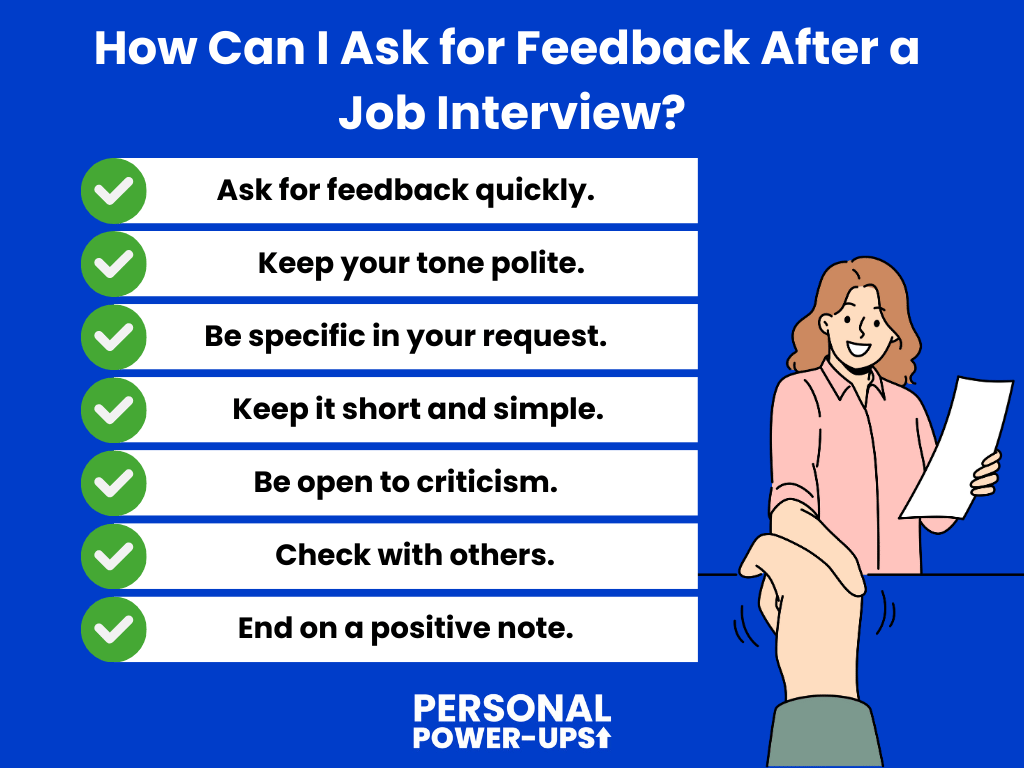You’re not alone if you dread job interviews, as there’s a lot of pressure to make a good impression within a matter of minutes. It stings if you’re rejected after a job interview despite your best efforts, but it also presents a golden opportunity for growth. By asking for feedback, you gain valuable insights to improve your future applications and interviews. Here’s how to ask for feedback after a job interview the right way.

Contents
How to Ask for Feedback After an Interview
1. Ask for Feedback Quickly
The best time to ask for feedback is soon after you receive the rejection, ideally within a day or two. Any longer, and the hiring manager may have moved on mentally (and may not even remember the interview that well anymore). A quick response shows your professionalism and leaves a positive impression. If your rejection is through a phone call, then it provides you with the ideal opportunity to immediately ask for feedback.
Example: “Thank you for letting me know. While I’m disappointed I wasn’t selected, I’d appreciate any feedback you can share to help me improve for future opportunities.”
▼ Ad
2. Be Polite
You’re not entitled to feedback, so approach your request with respect and use your social skills well. Keep your tone polite and avoid sounding resentful or defensive. The goal is to maintain a positive relationship with the company, as you never know whether you’ll apply for another position in the company in the future.
Example: “I appreciate the time you and your team spent during the interview process. If possible, I’d be grateful for any feedback on my performance, as I’m always looking to improve.”
3. Be Specific
A vague request (feedback on the entire application) probably gets you a generic response. Instead, ask for targeted feedback on key areas like your resume, interview answers, or overall fit. This helps the hiring manager give you actionable tips.
Example: “Could you offer any specific feedback on my answers to the technical questions? I’m looking to strengthen my skills in that area.”
▼ Ad
4. Keep It Short and Simple
Respect the hiring manager’s time by keeping your request brief. A short, well-crafted email will get you more results than a long, rambling message. Stick to the point—ask for feedback and express your gratitude.
Example: “Thank you again for the opportunity. I would really appreciate any brief insights you could provide regarding my interview performance.”
5. Be Open to Criticism
You’re asking for feedback to learn, not to argue or defend yourself. Be prepared to hear things that might be tough. Approach the feedback with an open mind and a growth mindset. And remember that feedback is valuable, but the opinion of one person doesn’t have to be valid.
Example: If the feedback suggests you lacked experience in a certain area, instead of feeling discouraged, take it as an opportunity to build those skills for future interviews.
▼ Ad
6. Check with Others
This point relates to the previous point: not every piece of feedback is valid. If one person says they find you too timid, it doesn’t mean that others feel the same. That’s why it’s always a good idea to check the feedback you’ve received with people around you. If multiple people agree with the feedback, it’s likely something you can further improve.
Example: “I was rejected for the job and when I asked for feedback they told me they found me too timid. Is this something you recognize? I’m trying to figure out how I can further improve myself, so I’d love to hear your thoughts.”
7. End on a Positive Note
Always end your request on a positive note. This shows maturity and professionalism and leaves the door open for future opportunities with the company. You never know whether you’ll apply for a job there in the future, so by leaving a positive impression, you’re more likely to be hired if you apply there again.
Example: “Thank you again for your time and feedback. I hope to stay in touch and would welcome any future opportunities to work together.”
▼ Ad
Conclusion: How do I Ask for Feedback after (a Rejection at) a Job Interview?
Asking for feedback after a job interview may feel awkward, but it’s one of the best ways to improve yourself. It may sting a little when you hear what didn’t go well, but view this as the starting point to improvement.
By being polite, specific and brief you make sure you receive the right feedback. Once you’ve received the feedback, be sure to approach it with a growth mindset and check with other whether the comments are valid. If the feedback is valid, continue to build on these specific skills and land that next opportunity!




